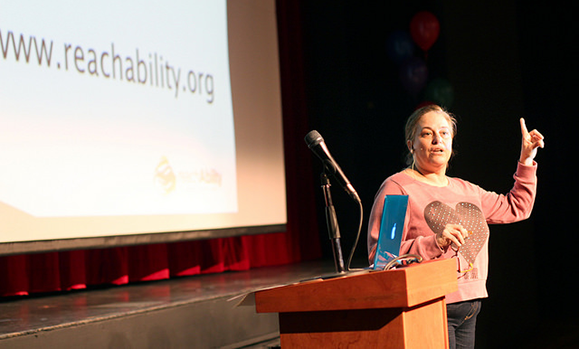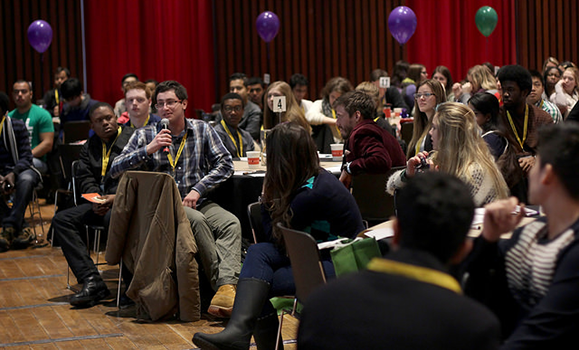What makes a good leader? Is it the ability to convince others to follow you? Having the skills to put together a good team? Being able to tell people what to do (without them organizing a mutiny)? On a stormy January 31, a group of almost 200 enthusiastic Dal students gathered in the McInnes Room to ponder the question and tap into their own leadership potential at the inaugural Dal Lead! conference.
Organized by a group of student staff from Dal’s Career and Leadership Development Centre (CLDC), DALconnects volunteers, and members of the DSU, the conference was designed to offer students a forum for learning how to effect positive change on and off campus, and how to apply their unique skills in the real world.
“We also wanted the conference to foster networks between the students, and allow them to reflect on their own experiences,” says Eric Donovan, the coordinator of experiential learning opportunities at the CLDC. “It also gave them the opportunity to re-energize for the winter semester.”
The conference kicked off with an energetic speech by Tova Sherman, co-founder and CEO of reachAbility, a non-profit organization that helps integrate stigmatized communities into the workplace. Sherman spoke about the qualities of a leader and how the way we define good leadership in society might be changing. She shared her personal belief that leadership is how we define ourselves, and that implementing leadership ultimately begins with self-awareness. “Who are you?” Sherman asked the audience. “And what can you do? What are you good at?”

Tova Sherman challenged the participants to explore their self-awareness.
Pondering Sherman’s questions, students broke off into the first of three breakout sessions of their choice. Speakers included students and local professionals, covering topics ranging from the importance of confidence and interdisciplinary communication skills in effective leadership, to basic leadership tips and tricks and how to apply these skills in the community
During lunch El Jones, Halifax’s poet laureate and Creative Writing instructor at Dal, gave a spoken word performance that focused on bursting the “university bubble.” She reminded students they belong to the larger Halifax community and challenged them to explore their role as community members. This opened a discussion on the connections between leadership and activism.
Ntombi Nkiwane, a second-year management student, led a breakout session with Jones about getting involved in community projects and events off campus. Nkiwane explained the role of being a leader in an activist setting and encouraged students to use their passions and skills to help others.

Students then participated in a think tank simulation to reflect on the day. Many groups discussed Sherman’s initial definition of a leader and the variety of leadership styles around the world. Other groups reflected on the qualities of a leader: core values of respect, passion, and the ability to inspire. During this session, students brainstormed further improvements for next year’s conference.
The day ended with a presentation by Dave Meslin, a self-described “community choreographer” from Toronto. Meslin encapsulated the ideas of leadership and activism that were discussed throughout the day, and emphasized the power of the individual to make a difference in the world. His parting words to the students focused on his belief that a true leader empowers other leaders. As they left for the Dal After Dark after party, it was clear the day’s events had had an impact on them.
“The speakers were totally inspiring,” says third-year therapeutic recreation student Rachele Manett. “I really enjoyed meeting all the different people there and learning why they took part. I thought it would be a good experience to hear from other student leaders and learn from them. I thought it was really interesting how not everyone who attended thought of themselves as leaders, but to me they all were because they made the effort to go.”

